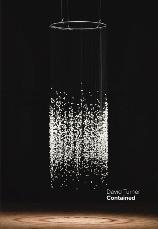Poetry review – Contained: Julie Hogg immerses herself in David Turner’s poetry collection with multimedia accompaniment
 Contained
David Turner
Hesterglock Press
ISBN: 9781916159464
78pp £10
Contained
David Turner
Hesterglock Press
ISBN: 9781916159464
78pp £10
Contained, is David Turner’s debut collection, a multi-media project which deftly straddles art forms. The text incorporates QR codes which link to the audio elements via a SoundCloud page. Through prose-poetry, essay-writing, visual poems and audio recordings of each poem it explores the themes of social class and mental health – in terms of both lived experience of the author and a wider discussion. David Turner is also the founding editor of the Lunar Poetry Podcast series. This body of work is a necessary, erudite, multi-sensory, brutal and tender deluge. It is unflinching.
It’s hard to escape the irony of reviewing this collection during a global pandemic; so closely does it resonate with this precise moment in a multitude of ways and, ‘investigates how the partitions within our heads resemble the walls around us.’ The title itself begs me to contemplate the meaning of containment; to have or hold something inside, to be created from a number of things or to be restrained or controlled. The cover image, ‘Of Things I Can’t Unthink,’ by Carissa Baktay, is precisely chosen to correspond with the meticulously precise writing.
The poet has rigorously chosen a form to suit each poem and the variety of form in this work is exciting and extremely satisfying. The combination of concrete poetry and visuals is fresh, progressive and innovative; particularly in the use of architectural diagrams and building floorplans. 
‘A >> B,’ swirls dizzily round a bedroom:
At what point do you share your mental health crisis plan with a partner?
I play the track which accompanies the poem on SoundCloud: your eyes, and drinking spirits alone at home and… Phrases continue in repetition, restrained refrains trace a way into the kitchen, a door cannot be opened; taped up in red, words continue to direct a walk through a utility area, back into the kitchen and onto a staircase. Music is pitch-perfect too; taut synthetic strings cauterize each honed word at breaking point and my senses overwhelm me. And I cry.
‘they don’t call time while you’re still drinking,’ is a long poem, a hybrid of poetry and prose, with a searing-iron voice both metaphorically and physically:
I stay silent as you jab at me with compliments, stay silent and replay
memories of east-Berlin bars which seemed to have opened decades
before just so we’d all have somewhere to meet.
Turner also reads his work without any arrangement of music or noise during this recording. Silence of these elements is equally atmospheric and, again, chosen with great care; many of the audio readings have a silent accompaniment, ‘Taxis on Old Pye Street,’ is a reading in the poet’s subtle, hypnotising vocal tone. This poem is also beautifully formed on the page with exquisite imagery evoking a comforting admonishment of urban place:
I stand – ear toward the wind hoping to mimic your breath on
my neck. Cars throw their lights. Ignored they shatter on
wet concrete.
Bleed out over tarmac.
There are three ekphrastic poems in this collection, entitled ‘String Section,’ ‘Sounding,’ and ‘Kerf.’ Each one is a perfect response to paintings by Norwegian artist Erik Pirolt, Contained in Pirolt’s work are depictions of human mutilation; this is from ‘Kerf:’
this gift for you
this torn skin
this muffled-clack of saw teeth skipping over radius
these vibrations through worn-out-oak-table-top
these hairs on neck
Turner writes, ‘your eyes is wet – i want to lick them (a recipe for making fudge)’ after ‘Gunmetal (for Ian E) by Rishi Dastidar,’ and ‘Phosphate of calcium,’ after John Berger. Once again both pieces combine tenderness and graphically stark realism. If Picasso was, ‘concerned with verisimilitude,’ then so is Turner. Notes on the text include a cherishing quote by Berger which informs this poem.
We are just dust.
(Firn has the look of glacial
ice but like grains of sand
only holds together under
compression)
‘Creased green slips,’ is a consummate thematic prescription-drugs sequence which compelled me to return to its pages intermittently whilst reading the whole collection; this sequence adroitly witnesses containment of body, mind and self:
‘the metallic taste they warn you about is just regret. The end of taste’
‘Too young to realise that working-class women are all too aften given something to shut them up’
‘And isn’t it ironic that the lithium keeps you alive while slowly poisoning you –'
Throughout this debut collection we find accomplished and outspoken work, Here is part of ‘Again’:
But I’m still me and I’m still crying at breakfast.
Because there are
times when there is just no escape. You don’t escape yourself and I
was there in Berlin and I was there in Stockholm and I was there in
Chicago …
‘Tetris,’ is an astounding poem which depicts the practical details of a proposed house share in South London with an emotional undercurrent cleverly implied. ‘Eat da Rich’, is the poet’s reflection on this poem’s competition and publication success, side by side in unusual juxtaposition.
The poet reads the final poem of this work alongside an intoxicating audio track of other people’s voices, bicycles, footsteps echoing on concrete in a tunnel, descending and ascending towards the light.
Within this book there is solitude, hope and loss. As Berger also says, ‘I despise the dust of which I am composed: anyone can pursue and put an end to this dust. But I defy anybody to snatch from me what I have given myself, an independent life in the sky of the centuries.’
Turner has written a fine collection. He is an intriguing contemporary author and I want to read more of his recent work and look forward to forthcoming titles.
Apr 3 2020
London Grip Poetry Review – David Turner
Poetry review – Contained: Julie Hogg immerses herself in David Turner’s poetry collection with multimedia accompaniment
Contained, is David Turner’s debut collection, a multi-media project which deftly straddles art forms. The text incorporates QR codes which link to the audio elements via a SoundCloud page. Through prose-poetry, essay-writing, visual poems and audio recordings of each poem it explores the themes of social class and mental health – in terms of both lived experience of the author and a wider discussion. David Turner is also the founding editor of the Lunar Poetry Podcast series. This body of work is a necessary, erudite, multi-sensory, brutal and tender deluge. It is unflinching.
It’s hard to escape the irony of reviewing this collection during a global pandemic; so closely does it resonate with this precise moment in a multitude of ways and, ‘investigates how the partitions within our heads resemble the walls around us.’ The title itself begs me to contemplate the meaning of containment; to have or hold something inside, to be created from a number of things or to be restrained or controlled. The cover image, ‘Of Things I Can’t Unthink,’ by Carissa Baktay, is precisely chosen to correspond with the meticulously precise writing.
The poet has rigorously chosen a form to suit each poem and the variety of form in this work is exciting and extremely satisfying. The combination of concrete poetry and visuals is fresh, progressive and innovative; particularly in the use of architectural diagrams and building floorplans.
‘A >> B,’ swirls dizzily round a bedroom:
I play the track which accompanies the poem on SoundCloud: your eyes, and drinking spirits alone at home and… Phrases continue in repetition, restrained refrains trace a way into the kitchen, a door cannot be opened; taped up in red, words continue to direct a walk through a utility area, back into the kitchen and onto a staircase. Music is pitch-perfect too; taut synthetic strings cauterize each honed word at breaking point and my senses overwhelm me. And I cry.
‘they don’t call time while you’re still drinking,’ is a long poem, a hybrid of poetry and prose, with a searing-iron voice both metaphorically and physically:
Turner also reads his work without any arrangement of music or noise during this recording. Silence of these elements is equally atmospheric and, again, chosen with great care; many of the audio readings have a silent accompaniment, ‘Taxis on Old Pye Street,’ is a reading in the poet’s subtle, hypnotising vocal tone. This poem is also beautifully formed on the page with exquisite imagery evoking a comforting admonishment of urban place:
I stand – ear toward the wind hoping to mimic your breath on my neck. Cars throw their lights. Ignored they shatter on wet concrete. Bleed out over tarmac.There are three ekphrastic poems in this collection, entitled ‘String Section,’ ‘Sounding,’ and ‘Kerf.’ Each one is a perfect response to paintings by Norwegian artist Erik Pirolt, Contained in Pirolt’s work are depictions of human mutilation; this is from ‘Kerf:’
this gift for you this torn skin this muffled-clack of saw teeth skipping over radius these vibrations through worn-out-oak-table-top these hairs on neckTurner writes, ‘your eyes is wet – i want to lick them (a recipe for making fudge)’ after ‘Gunmetal (for Ian E) by Rishi Dastidar,’ and ‘Phosphate of calcium,’ after John Berger. Once again both pieces combine tenderness and graphically stark realism. If Picasso was, ‘concerned with verisimilitude,’ then so is Turner. Notes on the text include a cherishing quote by Berger which informs this poem.
We are just dust. (Firn has the look of glacial ice but like grains of sand only holds together under compression)‘Creased green slips,’ is a consummate thematic prescription-drugs sequence which compelled me to return to its pages intermittently whilst reading the whole collection; this sequence adroitly witnesses containment of body, mind and self:
Throughout this debut collection we find accomplished and outspoken work, Here is part of ‘Again’:
But I’m still me and I’m still crying at breakfast. Because there are times when there is just no escape. You don’t escape yourself and I was there in Berlin and I was there in Stockholm and I was there in Chicago …‘Tetris,’ is an astounding poem which depicts the practical details of a proposed house share in South London with an emotional undercurrent cleverly implied. ‘Eat da Rich’, is the poet’s reflection on this poem’s competition and publication success, side by side in unusual juxtaposition.
The poet reads the final poem of this work alongside an intoxicating audio track of other people’s voices, bicycles, footsteps echoing on concrete in a tunnel, descending and ascending towards the light.
Within this book there is solitude, hope and loss. As Berger also says, ‘I despise the dust of which I am composed: anyone can pursue and put an end to this dust. But I defy anybody to snatch from me what I have given myself, an independent life in the sky of the centuries.’
Turner has written a fine collection. He is an intriguing contemporary author and I want to read more of his recent work and look forward to forthcoming titles.